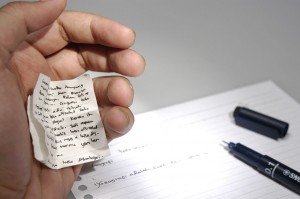PhD in Music Psychology: Viva
Hello Dear Reader

This week I enjoyed a phone call with a much-missed colleague Elena, from Switzerland. You can see my Swiss colleagues in this photo of my leaving party.
I am sure she won’t mind if I talk about the fact that Elena just handed in her PhD, which I had the pleasure of helping to supervise when I lived in Lucerne last year.
Elena’s PhD is entitled ‘Evaluating recorded performance: An investigation of music criticism through Gramophone reviews of Beethoven piano sonata recordings’.
It is a fascinating study of music critique; how style and form has changed over nearly 100 years of written text. She breaks down the different components of review, such the performance itself as well as the work and the recording, and gives each a thorough and enlightening examination. As you can tell, I enjoyed working with her on this thesis.
Our conversation this week focused on the final hurdle of any PhD – the viva. I thought that I would write down my thoughts about our conversation for you, Dear Reader, in case you or anyone you know might one day be called upon to take part in such an exam.
Here is my description of viva, its purpose and form, and how I recommended Elena to prepare for her big day. My advice refers to the PhD viva as it stands in the UK, where the viva is an exam and not a public formality.
What is a viva?
The viva is short for ‘viva voce’, a Latin phrase meaning “with living voice”. All music exams used to have a viva voce component, which was the sung response section of the test.
Nowadays ‘viva’ is used most often to refer to a PhD oral examination, which takes places once a written thesis has been submitted and read by examiners.
The viva is a meeting between the examination panel and the candidate. The panel consists of at least two examiners where at least one of them is an ‘external’ examiner, someone from a different institution to the candidate.
Some Universities also employ an internal examiner, typically a person in a similar but not the same field as the candidate. My internal examiner was an expert in auditory perception, for example. Finally, some universities employ an impartial observer or record the viva.
It should be up to the candidate whether their PhD supervisor/s attends the viva. As far as I know no UK institution makes supervisors attend, but good supervisors should offer.
 In some cases a candidate may feel that their supervisor’s presence offers reassurance, though they will not say anything. Most people would prefer their supervisor was not present. Perhaps they feel their supervisor might make them nervous? That is fine: and completely up to the candidate. No PhD supervisor will take offence if the candidate would prefer they were not there. I would head out to buy champagne instead 🙂
In some cases a candidate may feel that their supervisor’s presence offers reassurance, though they will not say anything. Most people would prefer their supervisor was not present. Perhaps they feel their supervisor might make them nervous? That is fine: and completely up to the candidate. No PhD supervisor will take offence if the candidate would prefer they were not there. I would head out to buy champagne instead 🙂
Why would you record a viva?!
I want to address this question, as some candidates get anxious at the idea of an independent observer taking notes or an audio/ video recording being taken of the viva. In some universities, like mine (University of York, UK), an audio recording was actually compulsory.
The reason is straightforward – it is for the good of the candidate. There are very, very rare cases where a candidate feels they were mistreated by their examiners. This could include inappropriate questioning or behavior that amounts to bullying – now, please be reassumed that this is NOT AT ALL common. But mean people exist in all walks of life so we must legislate for them.
In the highly unlikely event that something like this happens then an unbiased recording of the event will allow an independent panel to decide whether the viva was conducted in an appropriate and professional manner by the academics. It ensures that the candidate gets the treatment, respect, and good viva experience that they deserve after all their hard work.
A viva recording should never be used to change the decision of the panel in any other circumstances. The decision stands as final on the day, when it is made by the examiners and communicated to the candidate.
What is the purpose of the viva?
1) Ensure that the candidate wrote the thesis

If a candidate wrote the thesis then they have nothing to worry about – the way they speak about their work, it will quickly become obvious to the examiners that this is their ‘baby’.
If a candidate didn’t write it then…bad candidate, out you go. It is possible to buy a PhD thesis so examiners have to make sure that this is not the case.
2) Assess whether the candidate is able to defend their work
One of the jobs of a future academic will be to defend their work – in papers, during a poster presentation, after a talk, or even in conversation with colleagues. The PhD viva is no different, the examiners want to hear that the candidate is able to think critically about their work and argue as to why they adopted certain method or interpretations.
Again, this is nothing to worry about. A candidate will have ‘defended’ their ideas 100s of times by the time they get to viva. But probably not to these examiners, so they need to hear it for themselves.
3) Explore the contribution to knowledge
The main point of a PhD is to make a contribution to knowledge. A candidate will likely be asked to name a few ways in which their thesis has made an impact – What are the new methods or findings? Are there challenges to previous ideas? Has the candidate provided a new dataset or protocol for future research?
I advise all my candidates and friends before viva to take a notebook and on the front page to list between 3-5 contributions to knowledge from the thesis. There is no problem with them reading these in the exam, there is no rule that says these ideas must spring from the top of their head. And having these contributions at the front of notes will give them confidence.
4) Clarify the thesis
This is the point that will take up most of the conversation. The examiners will have read the work but might be a unsure or unclear about a few points. They will ask for clarifications. This usually means the writing could be a bit clearer and this is something that can be fixed later in the revisions.
Another possibility is that the examiners will have some interesting ideas about how the work was done. This is the second reason to take a notebook. Scribble these ideas down. The viva is the most time any senior academics will sit down with a candidate and just talk about their ideas and work. They should take advantage. And remember that a candidate is well within their rights to ask the examiner to clarify their questions or points.
Preparation – do I read the thesis?
A supervisor will no doubt advise a candidate to re-read their thesis a couple of times before the viva. This was what I was told. And guess what? I did not open the thing between submission and viva – not once.
 I handed in at the start of September and my viva was in December. In the meantime I moved to London and started a new job. I had little time for extra reading plus I had a stress reaction every time I went near my thesis. The point of all this is not to tell a candidate what to do but to tell you that I got through it without reading my thesis in its entirety after submission.
I handed in at the start of September and my viva was in December. In the meantime I moved to London and started a new job. I had little time for extra reading plus I had a stress reaction every time I went near my thesis. The point of all this is not to tell a candidate what to do but to tell you that I got through it without reading my thesis in its entirety after submission.
If a candidate feels that they need to then they should read it. But one piece of advice in this case – do not go looking for mistakes. A candidate will not get extra marks for pointing these out in the viva. Just read for clarification and memory, if the need arises.
In my experience, unless there is a long time gap, then most candidates at viva know their thesis inside out.
A better use of time, for me, was a mock viva run by my supervisor. He asked me a few questions about the thesis contents and how they came about, including asking me to summarize the main findings in under 2 minutes. This was a helpful exercise for me and gave me a lot of confidence going into my viva.
How long does it take?
Everyone told me a viva took at least 2-3 hours. You only seem to hear horror stories of 5-6 hours or more running up to the exam. So when my viva took 90 minutes I walked out thinking ‘was that it?!’
No one can tell you how long a viva will be. Just remember that a candidate can ask for a break at any time, within reason (i.e. not every 5 minutes…)
What are the possible outcomes?
Failure is rare. And in most cases of failure, the thesis was a fail to start with and the viva was conducted to see if there was anyway to salvage the work. Probably around 2-5% of vivas end up this way in the UK at present.
75% – 80% of candidates, the vast majority, come out with a list of minor written corrections and lots of ideas of how to develop the work in the future. This was my experience. My written corrections were completed one chilly December morning, and approved in time for Christmas.
Around 10-15% of candidates get what we call major corrections, where the examiners feel that more substantial writing, some re-analysis or additional investigation must take place. Usually the candidate is given a timetable, around 6 months, to complete this work, after which time they may or may not have another viva.
Finally 2-5% are told that their PhD is perfect and is to be accepted as it is at the end of the viva. I knew someone who passed this way once. And yes, he was a clever sod.
Best advice
- Know your rights – know what you can ask for during the viva: a recording, clarifications, a break, whatever you need. Just speak up.
- Take a notebook. Not a computer unless you can’t live without a screen; who needs the stress of worrying about the thing dying on you? An old-fashioned pen and paper is great to note down any interesting points or to sketch out an idea for your examiners – sometimes visuals help.
- Take your thesis. If the examiner refers to p.67, third paragraph then ask for time to read it then and there before answering. No one expects you to know the thing by heart.
- Take your favourite drink – sensible drink, I mean. Something to soothe you and refresh your throat, as you will be talking for a while.
- Ask for a mock viva, or at least discuss the main findings and contributions of the thesis in advance.
- Do not try and guess what the examiners will ask – I came up with at least 3 ‘mistakes’ I was sure would come up and worried about them for at least a week beforehand. None of them were ever brought up.
- I would say to relax but this is obvious. What is undeniable is that the vast majority of people who have been through a viva will tell you they worried far more than was necessary and that in reality, they enjoyed this extended conversation about themselves and their work with colleagues.
- Your examiners are interested in you and your work – that is why they agreed to take on the task of reading your thesis and attending the viva. So seek their advice and ideas, as well as listen to their comments. Some people go on to collaborate with their examiners on the basis of viva conversations.
That is a lot of blog, isn’t it, Dear Reader? I hope that you have found some useful advice to take or pass on to others.
I know that Elena will be absolutely fine at her viva soon. I also know she will worry, so if you are reading this Elena then please breathe and remember what I told you – you and your thesis are brilliant so just go in there and enjoy talking about yourself for a couple of hours 🙂



